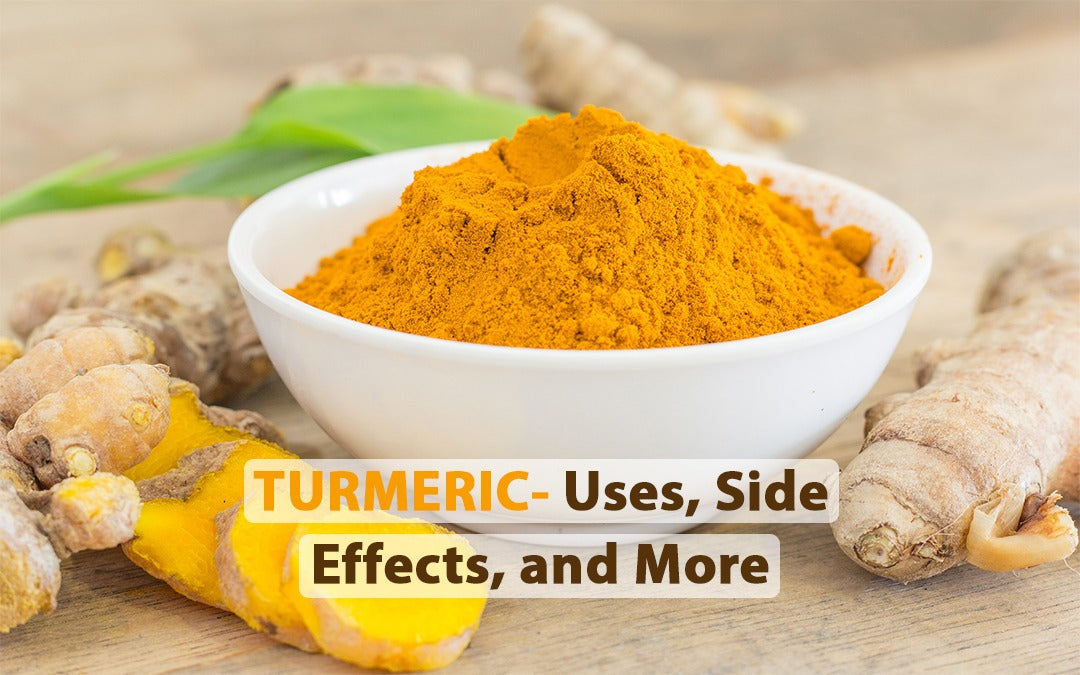Turmeric powder is a vibrant yellow spice powder made from dried turmeric rhizomes. It has a slightly peppery and warm flavour which, together with its vibrant colour and preservative properties, make it a great culinary ingredient. The presence of 'curcumin' also makes it suitable for cosmetic and medicinal purposes.
Turmeric and its most active compound, curcumin, have numerous scientifically proven health benefits. These benefits include the potential to improve heart health, prevent Alzheimer's and cancer, and act as a potent anti-inflammatory and antioxidant. Additionally, turmeric may help improve symptoms of depression and arthritis.
Top 5 Health Benefits of Turmeric
1. Anti-Inflammatory Properties-Turmeric contains curcumin - a powerful anti-inflammatory agent that has been shown to be just as effective as some prescription medications, but without the side effects. So if you're looking for a natural way to control inflammation, turmeric is a great choice.
2. Antioxidants- Free radicals are known to cause long-term cellular damage within the body, which is a trigger for both ageing and diseases. Antioxidants are the solution to preventing this damage. They work by scavenging these free radicals before they have a chance to inflict oxidative stress on your cells.
3. Lowered Risk of Heart Disease- Turmeric has the potential to help reverse the effects of heart disease by improving the function of the lining of your blood vessels. This, in turn, helps regulate your blood pressure, blood clotting and other factors that are essential for heart health.
4. Prevention of Brain Disease- Turmeric has been shown to help lower risk of brain disease. Curcumin, the active ingredient in turmeric, has also been studied for its potential in preventing and treating Alzheimer’s disease. Curcumin may affect brain function and the development of dementia, making it a promising natural remedy for these conditions.
5. Increased Digestive Health- Turmeric is a natural remedy for stomach pain, constipation, and irritable bowel syndrome. Its anti-inflammatory properties also make it effective in preventing ulcers and reducing digestive system irritation. As a result, turmeric can be helpful in managing a wide range of gastrointestinal disorders such as IBS, Crohn’s disease, and diarrhoea.
Special Precautions and Warnings
When taken by mouth: Turmeric is a spice that has long been used in traditional medicine and is generally considered safe when used short-term. Studies have shown that taking up to 8 grams of curcumin, which is the active ingredient in turmeric, daily for up to 2 months is safe. Also, taking up to 3 grams of turmeric daily for up to 3 months seems to be safe and well-tolerated. Turmeric usually doesn't cause serious side effects but some people may experience mild side effects such as stomach upset, nausea, dizziness, or diarrhoea. These side effects are more common at higher doses.
When applied to the skin: Turmeric seems to be safe for most people when taken by mouth or applied to the skin. However, some people may experience side effects like stomach upset, diarrhoea, or skin irritation. When applied inside the mouth, turmeric may also cause mouth sores.
Breast-feeding:Turmeric is often used in small quantities as a spice in food. However, there is not enough reliable information available to know whether it is safe to use turmeric medicinally while breastfeeding. To be on the safe side, it is best to avoid using it.
Gallbladder problems: If you have gallstones or a bile duct obstruction, turmeric can make your condition worse. Avoid using turmeric in these cases.
Bleeding problems: Taking turmeric might slow blood clotting. This might increase the risk of bruising and bleeding in people with bleeding disorders.
Hormone-sensitive conditions such as breast cancer, uterine cancer, ovarian cancer, endometriosis, or uterine fibroids: Curcumin, a chemical found in turmeric, might act like the hormone oestrogen. This could potentially have effects on conditions that are sensitive to hormones. More research needs to be conducted in this area before any definitive conclusions can be drawn. In the meantime, use caution if you have a condition that worsens with exposure to hormones.
Liver disease: There is some concern that turmeric can damage the liver, especially in people who have liver disease. Don't use turmeric if you have liver problems.
Surgery: Turmeric could possibly slow blood clotting, and might cause increased bleeding during and after surgery. If you are scheduled for surgery, discontinue use of turmeric at least 2 weeks in advance.

